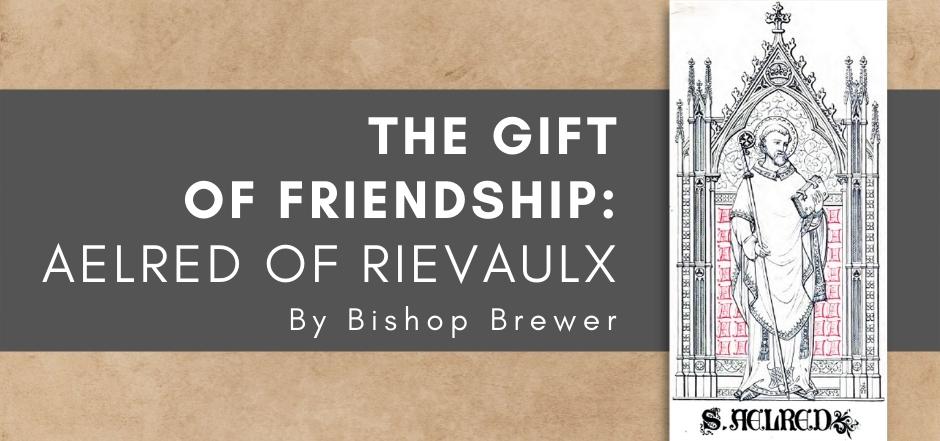The Gift of Friendship: Aelred of Rievaulx
Allow me to introduce you to the 12th-century Celtic figure Aelred, who ended up being the abbot of Rievaulx in France and whose feast day we celebrate on Jan. 12. Aelred did something in medieval spirituality that was actually rather revolutionary.
If you read the medieval mystics – John of the Cross, Teresa of Avila, people like that – the whole focus of their lives and writing is a deeper and more intimate relationship with God. Rarely do human relationships come into account. It is the model of the lone celibate, privately pursuing with all of his or her might an intimate and often mystical relationship with God. In parts of the church, that has always been held up as the highest ideal.
An Important Relationship
Aelred said, in essence, “Not enough.” There must be human interaction, which he said was also a gift from God, not incidental to the Christian life but quite important. And out of that, he began to write a rule for his monks in a way that many considered surprising: He allowed for friendships. The sentiment of the time was that “preferential relationships” (said very disparagingly) within the context of a monastic house were somehow detrimental to community life.
But Aelred said something very different: “Friendships are important.” And out of that, he wrote a treatise that still holds lessons for us today. Here’s a quote:
There are four qualities which characterize a friend: loyalty, right intention, discretion and patience. Right intention seeks for nothing other than God and natural good. Discretion brings understanding of what is done on a friend’s behalf and the ability to know when to correct faults. Patience enables one to be justly rebuked when needed, or to bear adversity on another’s behalf. Loyalty guards and protects friendship in good or bitter times.
A Biblical Precedent
The story of Ruth and Naomi is a perfect place to see this kind of loyalty in the scriptures. We remember Naomi’s famous declaration to her mother-in-law, Ruth: “Do not press me to leave you or to turn back from following you! Where you go, I will go; where you lodge, I will lodge; your people shall be my people, and your God my God” (Ruth 1:16).
But the New Testament offers us an even higher example. Who models the right intention of friendship best for us? Jesus Christ. In his own revolutionary fashion, he said to his disciples, “I do not call you servants any longer, because the servant does not know what the master is doing; but I have called you friends” (John 15:15a).
Paul speaks to us about the kind of discretion friendship requires: “If there is any encouragement in Christ … be of the same mind, having the same love … in humility regard others as better than yourselves” (Phil. 2:1-3b). In other words, I should live in a way that reflects the understanding that friendship is something I serve, not manipulate to get my needs met.
Jesus’ interaction with one of the scribes, recorded in Mark 12:28-34, is an example of yet another of the qualities Aelred mentions: patience. This is an example of a scribe who, in essence, crosses the line of demarcation and has a true conversation with Jesus, not finger-pointing but asking a genuine question about which commandment is the greatest. We can all learn from the patience with which Jesus deals with this scribe and his willingness, not to shift his position, but to speak with an incredible generosity: “You are not far from the kingdom of God” (Mark 12:34). This means even more because, after all, who is the King?
A Necessary Element
Like Aelred, I want to hold out the importance, even the necessity, of Christian friendship, both for a healthy personal spirituality and in terms of the life of the local church. It takes work to form friendships.
As I enter a relationship with God, my hope and expectation is that, in the way he interacts with me, he will teach me what it means to be a friend. And that in so doing, I will experience the task and the call to live out Aelred’s values of loyalty, right intentions, discretion and patience in a way that builds faithful friendships with other people.
Jesus never forsakes us. And a part of what he does is invite us into relationships that model the love he has for us. That’s what Aelred was writing about, and it’s what Jesus has given us in calling us friends.
God, show up and help us to cultivate those same kinds of friendships – both because we need them and because we can be the gift of God for other people.
How have you experienced the gift of Christian friendship? Share this blog and your response on Twitter. Please include my username, @revgregbrewer.
(This post is an adaptation of Bishop Brewer’s sermon on Jan. 12, 2017, in the Diocesan Chapel, Orlando.)
Unless otherwise noted, Scripture quotations are from the New Revised Standard Version Bible, copyright © 1989 the Division of Christian Education of the National Council of the Churches of Christ in the United States of America. Used by permission. All rights reserved.

